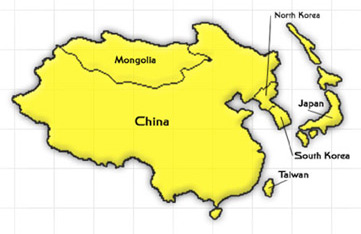Overview
The seven countries of Northeast Asia are lands humming with action. China, Japan and South Korea have economies that are growing at rates that almost defy imagination. The twenty-first century could easily be the time when Korean and Chinese missionaries take the lead in reaching the world for Christ. Presently, Korea is the second largest sending base in the world and is preparing to celebrate the 100th anniversary of the great Korean revival of the early 1900s when Pyongyang (A) was known as the “Jerusalem of Asia.” But China may soon catch up and surpass them because of their “Back to Jerusalem” vision to send Chinese missionaries back along the old Silk Roads carrying the gospel back to Jerusalem. Also, this is the first time when Mongolia has had a lasting Church and they too are already sending missionaries to other nations. Yet, over 450 people groups in Northeast Asia remain least-reached. North Korea, Mongolia and Japan remain formidable challenges with over ninety-five percent least-reached. China has over 499 least-reached peoples remaining; however, these people constitute only fourteen percent of the population. God’s time for Northeast Asia is now!
|
|
Prayer Points
- Fulfillment. Pray for God to show the peoples of Northeast Asia that true fulfillment and prosperity is found only in Jesus Christ who gives us life and that more abundantly.
- Freedom from fear. Pray these peoples living in fear of spirits and of the future to experience peace, joy and freedom from oppression.
- False teachers. Pray for discernment to recognize false teachers and to know the truth that sets them free.
- Father’s heart. Pray that the Father’s heart of love, acceptance and forgiveness will be experienced by every person among these least-reached peoples of Northeast Asia.
- Faithfulness. Pray for new believers to daily experience God’s faithfulness and to be faithful in their walk with him, letting their light shine before others so they glorify God in heaven.
Links
- Resources to pray, mobilize prayer and do outreach.
- Discover Northeast Asia’s 624 least-reached peoples.
- Pray for the peoples of Northeast Asia.
- Obtain daily prayer guides for peoples of this region.
![]()
Background
|
|
As the Wealth Gap Widens, the Spiritual Void Deepens
(Written by Keith Carey, managing editor of Global Prayer Digest)
The Han Chinese peoples are noted for their business savvy and their love of gambling. Perhaps the two dovetail when considering China’s urbanization efforts. According to a 7 November 2006 article in the BBC News, about thirteen million rural Chinese move to the cities each year. That is the same number as the entire population of Beijing. In the same article, it was also noted that at the current rate, China’s population will be fifty percent urban by 2010. Has there ever before been such a rapid rate of urbanization?
Ironically, the Communist Revolution of 1949 glorified the rural peasant. Millions of urbanites were sent to the countryside during the disastrous Cultural Revolution to learn proper communist values from the peasants. Millions of lives were ruined, and starvation was rampant.
Fortunately, after Mao’s death in 1976, China’s new leaders understood that they had to make drastic changes. They immediately began to soften the hard-line communist economic policies that were destroying China. The Chinese were once again free to do what they have always done well: run businesses. As time went on, the Chinese government learned that the country could greatly benefit were they to switch to an export-driven economy. Some, ironically the communist elite, were allowed to own their own businesses.
Brent Fulton is president of China Source, an organization that provides consulting and research on China’s societal trends mainly for humanitarian, business and educational organizations. In a 2000 interview with World Pulse, Fulton commented, “China is moving more toward a service, information-oriented economy. And you need a critical mass of people and in one place to make that happen. The agricultural economy is declining.”
The Wealth Gap Widens
There is a downside to China’s rapid urbanization. One obvious problem is the increasing gap between urban and rural China. According to a 17 December 2006 article in the Los Angeles Times, the average amount of disposable income for rural dwellers is less than a third of that for the urban population. It is clear that the gap between the rich and poor is also widening, especially since a capitalist economy does not offer the same guarantees as a socialist economy. To make matters worse, corrupt local officials are grabbing up land from farmers who have no recourse. It is no wonder that the rural population is fleeing to the cities. In 2005, the Chinese government reported eighty-seven thousand public disturbances, up fifty percent in two years. ![]()
According to a 26 August 2003 article in the New York Times,
There is also a dark underside of China’s economic success, which has been marked by annual growth of eight percent for more than a decade and exports to the United States growing so fast that they have surpassed Japan’s. In general these people [rural migrants] are vulnerable, pliable, cheap to employ and easy to suppress. The migrant workers number well over 100 million, staffing the factories of Asia’s export powerhouse. They work long hours in dangerous jobs for low salaries and no benefits. They are barred from forming unions. The Communist Party allows just one union, its own.
Some are forced into sex slavery and others have been physically abused by the police. But all in all, they would not come to the cities if the opportunities did not outweigh the dangers.
The government of China is facing its own dangers coming from the urban culture. They are finding out the hard way that loosening up the economy also brings pressure to loosen up in other ways. Even seven years ago there were an estimated ten million “netizens” or computer users in urban China. “I love the Internet because you have complete freedom to talk with people all over the world, hear music from any point on the planet and you never know where you’re going to end up next,” said one of these netizens to a Christian Science Monitor reporter in 2000. Such a situation may not work very well for tomorrow’s leaders of a totalitarian country.
China’s government is trying to keep some control over information, but it is a losing battle. According to a 5 February 2007 article in the New York Times, they are probably the ones responsible for blocking access to Chinese-language texts from the Marxist Internet Archive. Perhaps they see the past and realize that it did not work.
The Spiritual Void Deepens
Not only is the wealth gap widening, but the spiritual void is deepening. BBC News has printed two articles, one in October 2006 and another in February 2007, both of which show that there is a growing spiritual hunger in the Middle Kingdom. A poll of 4,500 people by East China Normal University professors found that 31.4 percent of the Chinese people over the age of sixteen consider themselves to be religious. That is triple the number that a government survey revealed. Although the survey demonstrated that the peoples of China are turning to spiritual answers from traditional sources like Buddhism and Taoism, Christianity is a big winner of spiritual adherents among the younger generation. Gone are the days when church is associated with those in their sixties and seventies.![]()
The reasons are not surprising. Many people are disillusioned with the direction life is taking them. Unbridled materialism is leaving many people out in the cold. Even some who are part of China’s privileged middle and upper classes are aware of the emptiness in their lives. “People are so busy making money that they’ve lost sight of the most important things in life,” explained one churchgoer to a BBC News reporter. In general terms, the Church is growing because people need support—to the poor its monetary support; to the wealthy it is emotional support.
“It used to be said by Chinese politicians of this Western faith, ‘One more Christian—one fewer Chinese.’ Now, they are more likely to say, ‘One more Christian—one fewer criminal.’” Although the government may appreciate the internal changes that faith in Christ brings, they want to keep Christianity under their control. China still has a communist government, meaning that they want allegiance to themselves, not to God. They do not want anyone to rival their role in setting the moral standards. Realizing that they cannot stamp out religious activity, there are government-sanctioned “Three Self” churches, filled with registered believers. The churches that they fear are the unregistered house churches.
What Future Church Growth in China’s Cities Might Mean
Paul Hattaway, author of several excellent books on the people groups of China, suggested that the vast majority of China’s urban population is from the reached Han Chinese groups. However, his book China’s Unreached Cities, Vol. 1 indicates that there are small communities of unreached people groups residing in many of China’s cities. Jim Nichols, former director of the U.S. Center for World Mission's Institute of Chinese Studies think-tank, wrote the forward to the book. In it, he made a significant statement:
The cities of China are gateways to the unreached of the country. Most efforts to reach the unreached peoples of China, especially among the minorities, have focused on taking the gospel to the villages that comprise their traditional homes. However, sizable populations of most if not all of these peoples may be found in the cities of China. Urban migration has resulted in ethnic ghettos springing up in many cities—“Chinatowns within China” one pundit has dubbed them. There is a high probability that discipling unreached peoples in the cities will result in the rural peoples they represent being reached as well.
Later in the article he pointed out that rural migrants to the cities frequently return once or twice a year for festivals. This can potentially be an excellent time for them to share Christ. He went on to say,
One of the advantages of this approach is that in the cities the differences between various subgroups of a given unreached people group become less important than their shared identity as part of the larger group. Our research has found that the migrants in urban centers from various Hani tribal villages, though they spoke as many as fourteen mutually unintelligible dialects at home, identified with one another as Hani, using Mandarin to communicate. This dynamic considerably simplifies the task of reaching the many people groups among the Hani with the gospel! The same may be true for many of the other unreached people groups of China.
Let Us Pray!
Thank the Lord that the efforts to reach China’s unreached millions are being simplified in the cities. Pray that the pockets of unreached people groups in China will be reached with the gospel, and that they will in turn take Christ back to their rural villages.


